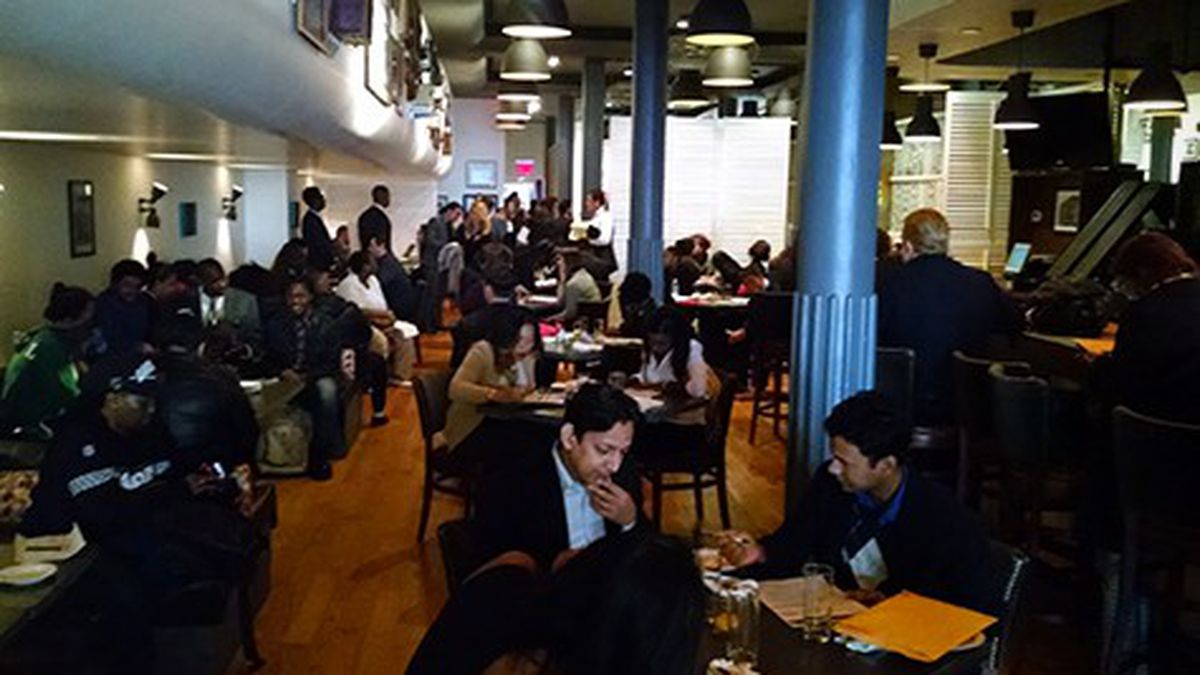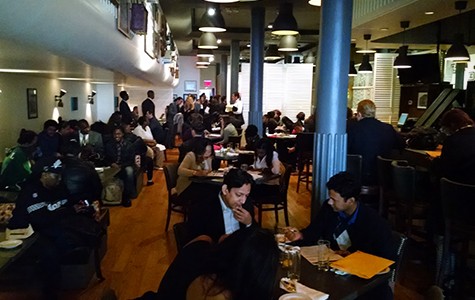Diners who walk into Colors, a gluten-free restaurant in New York City’s East Village, might not notice anything special about the place — maybe the social justice-themed artwork or the choice quotations from Eleanor Roosevelt and Cesar Chavez. But Colors differs from a traditional restaurant in several key respects: It’s run as a nonprofit, and in many ways the whole point of its existence is to provide a more equitable and humane labor model for the rest of the industry.
If that sounds like a good fit for Oakland, then here’s good news: The worker advocacy group Restaurant Opportunities Center United and the Ella Baker Center — the Oakland-based human rights organization — are partnering to open a new Colors restaurant in East Oakland. The restaurant won’t be gluten-free, given that each Colors location has its own chef and menu concept, explained Rosanne Martino, Colors’ national coordinator. The Oakland restaurant will probably have a soul food theme.
And if all goes according to plan, the Oakland eatery will be even more ambitious than the two existing Colors locations in New York and Detroit. Most notably, the restaurant will just be one component of an entire restorative justice hub — dubbed the Restore Oakland Center — which will include a training facility for the formerly incarcerated and will provide various “wrap-around” services, such as childcare for employees.
Some background: The Restaurant Opportunities Center (ROC) is a worker advocacy group that was founded in New York City to support restaurant workers who were displaced by the 9/11 World Trade Center attack — in part through the first Colors restaurant, which started off as a co-op that ROC helped bankroll. In the intervening years, ROC United, the national organization that sprang out of those initial efforts, has been best known for spearheading protests and workers’ rights campaigns. Most recently, ROC has been at the forefront of the movement to eliminate the tipped minimum wage — the practice, still legal in 43 states, of paying tipped employees a much lower rate than the regular state and federal minimum wage. (California is one of the handful of states that doesn’t allow a tipped minimum wage.)
Recently, though, ROC has placed a renewed emphasis on Colors, with an aggressive expansion plan that will add new locations in Oakland, New Orleans, and Washington, DC — all in the next year or so. And that makes sense: What better way is there to promote reform in the restaurant industry than to be the change you want to see — or, at the very least, to show what a restaurant with more progressive employment practices might look like.
For starters, Martino said, workers at Colors will be paid a fair, competitive wage, and employees who work at least twenty hours a week will be eligible for health benefits. And people won’t be pigeon-holed into one job path the way they tend to be at other restaurants.
“We have a hard time keeping a dishwasher because the chef will always say, ‘Hey, do you want to learn how to cook?'” Martino said.
But perhaps the most significant difference will be who you’ll find working at the restaurant, thanks to the Colors Hospitality & Opportunities for Workers (CHOW) program that will be housed there. That program offers on-the-job training to formerly incarcerated individuals, as well as to workers who are already working in the restaurant industry but are perhaps stuck in a low-wage job. One of the goals of the program is to try to equalize certain disparities that are rampant in the industry — for instance, a recent ROC-authored study found that people of color, particularly women, tend to be paid a significantly lower wage than white men, who are much more likely to hold high-paying, highly tipped, front-of-the-house positions.
If the Oakland restaurant is successful, it will put the trainees who start out working there on a path toward six-figure, front-of-the-house, waitering jobs in downtown Oakland, said Nwamaka Agbo, the program manager for the Restore Oakland Center.
The extent to which Colors and Restore Oakland can provide a sustainable model for other restaurants remains an open question, given the industry’s notoriously tight margins. Before it was reborn as a gluten-free restaurant in 2014, the Colors restaurant in New York had struggled financially — barely eking out “ten covers, twenty covers, thirty covers a night,” the opening chef told The New York Times in a 2007 profile of the restaurant. Agbo said the goal is that the restaurant itself would eventually become self-sustaining, though ROC United and the Ella Baker Center are currently trying to raise enough money to pay for its first year of operating costs. Already, the Restore Oakland Center is the beneficiary of a $500,000 investment from the Google Foundation and a $1 million investment from a private donor.
That cash will come in handy, given how ambitious the plans are for this Oakland hub, which in addition to providing childcare and other “wrap-around” services, will also include space for local restorative justice organizations and other nonprofits.
For now, Agbo and her colleagues are focused on finding a physical location for the Restore Oakland Center. They’re currently negotiating on a multi-story building in the Fruitvale district. The goal is to open the restaurant and the rest of the center in the spring of 2017.
















